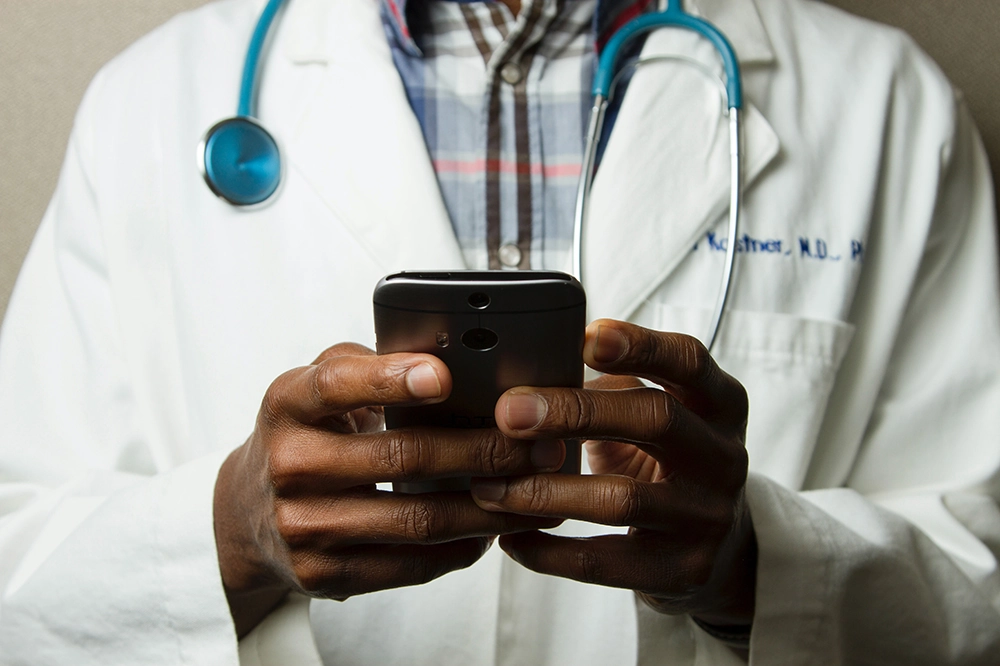
ChatGPT and other artificial intelligence tools are transforming the globe, and the healthcare field is no exception.
Artificial intelligence is a multi-faceted concept encompassing machine learning, deep learning, neural networks, natural language processing (NLP), data science, predictive analytics, and even robotics. Ultimately, these can all benefit healthcare systems and patient health outcomes.
Some also question the ethics of certain AI practices, and rightly so — this area can get very complicated, very fast. Patient permission and AI accountability are other ethical questions that need answering as we integrate the use of this powerful tool in our field.
ChatGPT has the ability to write medical school applications. Future patient behaviors can often be predicted by medical records.
Below, we’ll discuss applications of AI in healthcare, its benefits, and the potential downsides.
If you want a highly-qualified human to look over your AMCAS application and suggest meaningful edits, check out MedSchoolCoach’s AMCAS Editing service.
How is artificial intelligence used in healthcare?
The world of AI is evolving quickly, so it’s unclear to what extent we’ll see it used in our day-to-day professional lives in the future. However, research is booming and gives us many ideas for what this will look like very soon.
As artificial intelligence gets more and more advanced, AI will be useful in healthcare to:
- Automate communication and telemedicine with patients, clinicians, and administrators.
- Diagnose diseases based on medical imaging, such as X-rays.
- Predict injuries using AI algorithms and long-term patient data sets.
- Recommend clinical decisions, such as drugs or medical devices for treatment.
- Compose medical school essays or personal statements.
- Find and recruit individuals for clinical trials.
- Formulate clinical trials on precision medicine, drug discovery, telehealth, and mental health.
- Compile big data into meaningful metrics relevant to any number of stakeholders, from patients to hospital administrators and everyone in between.
Conversely, AI in its current form can make provider communications feel less human and individualized. Medical students who use AI to write content for their med school or residency applications may be perceived as robotic or lacking passion. AI may weaken trust between payers and healthcare professionals.
Read Next: What Are MD-PhD Programs? Overview & Program List
4 Benefits of AI in Healthcare
There are many potential benefits of AI solutions in healthcare, including:
- Quick text composition. AI tools like ChatGPT or Jasper help compose communications with patients and healthcare workers. Medical school students may use AI tools to outline, write, or edit personal statements or essays. In a live healthcare setting, quick text composition can also result in rapid patient care, allowing patients to chat with intelligent healthcare bots about symptoms, treatments, .
- Faster, more accurate insights. Machine learning algorithms can help healthcare organizations find real insights more quickly. Natural language processing may help get those insights to doctors or patients faster. In turn, patient outcomes will improve. One radiology-specific use case is that AI decision-making outperforms radiologists in identifying malignant tumors.
- Connecting disparate data. Healthcare data is fragmented in different formats. Machine learning technologies bring together different data to build a more unified picture for the individuals represented by that medical data. Connecting different data may improve accurate diagnoses, treatment plans, and health outcomes. (To put it in context: AI software can read, organize, and interpret data that would take a single human being multiple lifetimes just to read. This is accomplished in minutes, not years.)
- Efficiency improvement. AI can increase efficiency of healthcare organizations and electronic health record systems (EHRs) administrative workflows, communications, and financial operations. Improved efficiency may increase revenue and allow for lower cost to patients.
4 Risks of AI in Healthcare
There are risks and downsides to the adoption of AI in healthcare, including:
- Potential errors. AI tools are definitely known to be wrong, and patient injury may result. AI may recommend the wrong prescription, fail to recognize a growth in imaging, or base guidance on racially-biased data collection. If these AI tools become widespread, potential AI system errors could result in thousands of injuries — rather than a more limited number of injuries caused by a single healthcare provider’s error. These “hallucinations” occur when AI chooses what it believes to be a plausible answer that isn’t supported by its training data. (Sounds kind of human, doesn’t it?)
- AI transparency. Artificial intelligence never stops collecting information, but people are usually unaware that their data is being collected for machine learning purposes. However, data collection guidelines are often buried in user agreements. Transparency increases trust by disclosing when collected data has been used to create a tool, application, or message automation.
- User transparency. Individuals who utilize AI tools to compose a personal statement, a med school application, or even an email often do not disclose that AI technology is being used. Ethically speaking, disclosing whenever AI tools are utilized may benefit everyone, especially in the healthcare community.
- Loss of individuality. When communications — for example, between doctor and patient or administrator and nurse — are automated and AI-generated, a loss of humanity can worsen the recipient’s experience and even comprehension. Medical students who use AI to generate essays or applications may lose a sense of individuality crucial to standing out.
ChatGPT and Medical School Admissions
A growing issue in the healthcare sector is medical students who don’t put in the work that future doctors have done for decades. More and more med school students are using ChatGPT and similar NLP tools to fill out applications, write personal statements, and compose essays.
AI recognition software will continue to improve and weed out students who do not submit their own work — med schools are not looking for what a chatbot would say about you. Until then, students should be cautious in using AI tools to write for them.
Should you use ChatGPT to help with your medical school application? Here are the arguments for both answers.
- Yes, you should use ChatGPT. ChatGPT may be beneficial in providing diverse ideas for jumping off points, editing your work for grammar and punctuation, or helping overcome writer’s block.
- No, you should not use ChatGPT. ChatGPT doesn’t know or understand the personal stories that led to your passion for becoming a doctor. AI can’t authentically express compassion and empathy. It may destabilize your ethical footing, decrease the individuality of your writing, and hamper how much you’re learning. (And if that isn’t enough, medical schools will eventually be able to consistently verify use of AI to compose applications, which could drastically harm your career path.)
Here’s the reality: Beyond just impressive test scores, compelling human writing is the best way to stand out as a med school applicant. Physician advisors and writing advisors can help brainstorm, draft, or enhance your personal statement (on AMCAS, TMDSAS, or AACOMAS applications).
Will AI benefit the future of healthcare?
Without question, artificial intelligence will benefit the future of healthcare, especially if we implement these tools with great care. Human error and human inefficiency will decrease while data collection and processing will better serve both patients and medical professionals.
However, humans and organizations using AI tools need to be more transparent and very conscious of the ethics of AI.
AI will not make healthcare perfect. Though AI will most likely improve the healthcare industry and patient care, everyone should be wary of big tech companies, startup companies, healthcare organizations, regulatory bodies, and policymakers promising perfection instead of simply a new status quo.
Need admission consulting or application prep? Check out the Admission Consulting Service by our friends at MedSchoolCoach. Their expert advisors help you identify your application’s strengths and weaknesses, write and edit a killer personal statement, practice interviewing for medical schools, and support you whenever you’re feeling under pressure.
PS: Just in case you were wondering, this article was, in fact, written by a human being and not a chatbot.

Sahil Mehta MD
Dr. Mehta is the founder of MedSchoolCoach and has guided thousands of successful medical school applicants. He is also a practicing physician in Boston where he specializes in vascular and interventional radiology.





